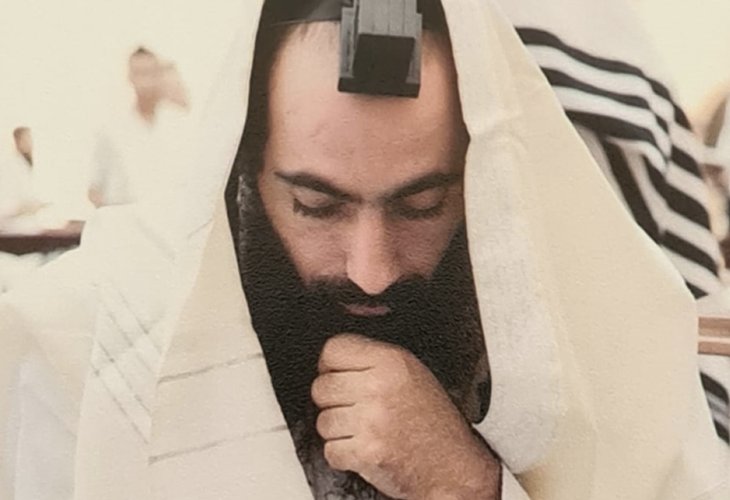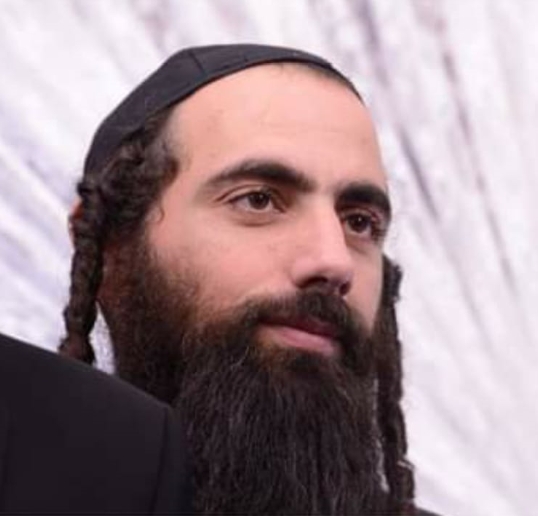Widow of Rabbi Shay Ohayon z"l Reveals in Exclusive Interview: "This Was His Last Request"
The widow Sivan, the young orphans, and the bereaved siblings talk to a Hidabroot reporter about the unique character of the holy Rabbi Shay Ohayon z"l.
 Rabbi Shay Ohayon z"l
Rabbi Shay Ohayon z"lAs the week of mourning for the murder of the holy Rabbi Shay Ohayon z"l draws to a close, I came to offer condolences at the family home and left with unimaginable insights into their faith.
A week and a half ago, on Wednesday, the 6th of Elul, Rabbi Shay Ohayon z"l was returning from the avrechim kollel where he studied in Kfar Saba. At Segula Junction, just 500 meters from his home, he was attacked by a vile terrorist and stabbed with a large knife, leaving Rabbi Shay with no chance of survival. The terrorist was captured after a short chase, but for Sivan, the newly widowed, and the four orphans, it was already too late. I came to the family home, knowing I couldn’t offer comfort. Such deep pain can only be soothed by the Comforter. I sat in silence, trying to convey the feelings of strength, faith, and the resilience that the broken widow imparts to those coming to console her.
"The absence is tremendous. The void is unimaginable," Sivan tells me as she sits in mourning on the floor, with the little orphan, Malachi, only four years old, in her lap. "When I talked with Shay about loss in the past, I told him I couldn’t bear something like this; it’s beyond my strength. We talked about it all the time, and here I am, exactly in such a situation," Sivan whispers in silence.
The quiet. The quiet is what characterizes the mourners. The widow sits on the floor and mainly remains silent, with all those around in silence as well. Sadness is the only thing that speaks through her eyelids. Even when she spoke, it was in the quiet tone of a wise woman who understands the battle before her, the struggle with the absence of the husband, the father who will never return.
"My Torah scroll has been burned," Sivan says with pain. "Shay was my entire world. I believe this was a decree ordained, that his life would be cut short. Hashem knows what is good for us. We don’t understand the ways of Heaven."
And again silence. There is nothing to say. The sadness is beyond words that can be described. I too remained silent. Sometimes silence has the power to scream pain that words cannot express. The pain of a fresh widow with a four-year-old orphan resting in her lap, who does not speak or tell what he really knows. Sivan gives him a hug and a kiss, trying to compensate for the father who is not there, puzzled by his innocent question, "When will Dad finish being in Heaven and come home?"
The widow wants to share something. She speaks in a painful and stabbing whisper: "Minutes before he parted from his study partner in Kfar Saba, he said to him something frightening and unimaginable." Sivan takes a breath, I understood there was something more, and the widow’s words again whisper, she musters courage and continues, "He told him: 'I ask you, do not eulogize me at my funeral. I warn you, if you eulogize me, I will come to you.' In those very words, his study partner told me. Apparently, his pure soul sensed what was to happen."
What gives you the strength to withstand such a terrible upheaval?
"The only thing that gives me strength is knowing that now Shay is in a world that is entirely good. He was sacrificed for the sanctification of Hashem's name, and now he sits and learns the holy Torah without any interruptions, in the quiet he loves."
The thing that characterized Shay the most, as I understand from all the family members, was modesty, humility, and an aversion to honor. The mourners showed the 'City Rabbi' certificate Shay received and said he hid it in a drawer and didn’t attribute importance to it. When his mother asked him, "Why didn’t you invite me to the certificate ceremony?" He told her, "Mom, it’s just a piece of paper. Why would I trouble you for a piece of paper?!" I asked to photograph the certificate, but the family members told me, "If you had asked Shay, he wouldn’t have agreed to publish the certificate." I was amazed and gave up.
Next to Sivan sits Tahar, the young orphan who is soon to be thirteen. "She’s so noble and mature," Sivan tells me, "with Hashem’s help, she will have a lot of strength for the road ahead."
With Rabbi Nachman in Paradise
Is it true he bought a ticket to Uman?
"Yes, he was a great devotee of Rabbi Nachman, a dedicated Breslov Hasid. He also bought a ticket for the 11-year-old boy and was sure he’d reach Uman to Rabbi Nachman. This year it is not clear who will be at Rabbi Nachman in Uman, but Shay is surely fortunate to be now with Rabbi Nachman in Paradise."
Sivan wants to convey a message and notes that to her understanding, if Shay could ask – this is what he would say: "I ask the people of Israel to maintain unity in all areas, the way to do so is not to be offended by anyone. Shay taught me how not to be offended by others, which saves all unnecessary friction. Commit to not being offended, see that it is possible, and it will be for the elevation of Shay’s soul."
Itzik, the bereaved brother, talks about the great loss: "I may be his older brother by years, but he was my elder brother in wisdom, in Torah, in manners, in all areas. It’s a difficult loss; I still haven’t managed to digest it."
Did Shay become religious?
"Yes. He initially studied in Bnei Akiva in Ra’anana, joined the army, and later, when his father passed away, grew closer to Judaism, became a follower of Rabbi Nachman of Breslov, and clung to his teachings.
"Shay’s pleasantness brought people back to the way of Torah and mitzvot. He didn’t engage in direct outreach, he didn’t tell anyone to put on tefillin or to strengthen themselves, but people who saw his behavior and his courteousness came back because of him.

"At the beginning of his married life, he lived with his in-laws in the village of Sha’ar Efraim. After a few years, as the children grew older, he realized that in Sha’ar Efraim, he couldn’t provide a Haredi education for his children, so he moved to Petah Tikva. Despite the fact that economically it was easier for him when he lived with his in-laws, it wasn’t a factor for him if it came at the expense of the children. This was his conduct at every stage in his genuine faith. But even though he moved from there - he continued to travel to the village to give them Torah lessons."
Itzik wants to add something: "Today exactly, the first of the month, Shay was supposed to be appointed as a rabbi in prison. The rabbi who examined him was here and told us that he didn’t know Shay, but he saw the purity on his face, the pleasantness and gentleness of his soul, and embraced him openly. He added that when Shay showed him the certificates, he said to him 'What are you coming here for? You are much more than me.'
From every possible angle, it is understood that Shay was only interested in the Torah and spirituality, and for that, he was capable of doing things that aren’t the most typical for a kollel avrech: "He was a simple man on the outside, even though he was a great Torah scholar with tremendous knowledge in Torah. He didn’t dress in any attire that highlighted his spiritual distinction, he was as simple as could be. His study partner once told him: 'If you don’t dress respectfully, people won’t respect you', and he replied: 'Great. It’s better that they don’t respect me. I’m not looking for false honor.' Modesty and simplicity were his guiding principles."
"If Shay had known how many people came to comfort him, he wouldn’t like it, because he wants to be on the side, in the corner. He wasn’t interested in fame and honor," concludes Itzik about his brother’s character.
Timing That is Not Coincidental
Where did the devastating news catch you?
"On that day, about half an hour before the murder, my phone died. My wife was with our children at her parents' in Be’er Sheva, and I called to tell her that my phone died, and if she wants to talk to me, she should try calling my mother who lives close by. Meanwhile, I took another phone that was at home, but its ring didn’t work. While I was pressing the device, I saw an incoming call from my sister Zehorit. I asked her, 'How’s it going?', and she replied, 'Not good'. I said to her: 'Well, why did you call to tell me that it’s not good for you?!', she immediately blurted out: 'Shay was killed in an attack'. I got dizzy, but I knew that now I had to go to Mom and inform her of the dreadful news. I didn’t know how to do something like that. I arrived at my mom’s house, she was watching the news and saw that there was an attack and an ultra-Orthodox avrech was killed, and she said to me: 'Wow, what a poor avrech who was killed, what a poor one', and I bit my lips and didn’t know what to do. I went out to the balcony to get some air and came back to drink something, and Mom again says to me: 'Wow, what a poor one'. After I told her that the murdered person was her beloved son, Shay’s study partner and kollel head entered the house and assisted in the most difficult time a person can face."
How did the children take the terrible news?
"It is impossible to explain to them, it is difficult and cannot be digested. The children still don’t understand the meaning. My six-and-a-half-year-old daughter asked me: 'How can it be that everyone came for Shay, and Shay himself is not here?'"
The impressions are hard, the emotions range from the widow’s tears to the frustration and confusion of the orphans, and I feel that my eyelashes are about to bear the burden. But suddenly, the father-in-law returns from the children’s educational institutions, he took them to school so they wouldn’t feel the mourners’ sorrow at home, and he tells me in pain: "I can tell you that we lost the crown jewel, he was the best person I knew. They were with us on vacation in the village of Sha’ar Efraim, and they also lived with me for 11 years, a modest man and of noble character."
What characterized Shay?
"You’ve already heard it from everyone here. What characterized Shay was modesty, simplicity, and humility. I feel he was like Rabbi Akiva, his entirety was filled with Torah. His whole being was Torah, and that was his desire," adds the father-in-law of the murdered, and says: "The nature of the world is that over time everyone disperses and forgets the widow and the orphans, who are left with the real dealing. But I, with Hashem’s help, will stand by them throughout the entire way."

